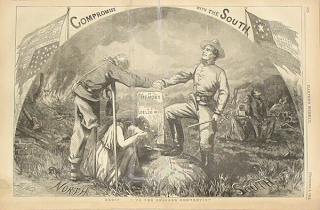In a previous post about editorial cartoonists, "Cartoons that can change history," I mentioned Thomas Nast. Today I'm going more into detail on his work. He was a cartoonist, an illustrator of children's books, and a contemporary of Lincoln. And, between his publication, Harper's Weekly, and the New York Times, Boss Tweed was indeed brought down. For biographical info on Nast, you can type his full name into the search input at Google and get a short history, pulled in from Wikipedia, some images and other searches related to Nast, and about 1,470,000 results. The same is true for typing in Boss Tweed, except only 1,300,000 results. A cartoon portfolio of Nast's work can be found at Ohio State University's site.
Nast's was published from 1859 to 1886. He supported Lincoln's Emancipation Proclamation and in the 1863 cartoon below linked emancipation with patriotism.
The cartoon below, also from OSU's site "was widely reproduced by the Republican Party for use in President Lincoln’s campaign."
His campaign against Tammany Hall and Boss Tweed deeply undermined the organization, which was considered a Democratic machine at the time. Below is his depiction of a gouty fallen ex-gladiator.
Harper's Weekly went out of print in 1916. And, since Nast's time, the Democratic and Republican parties have essentially switched roles. PBS has a timeline of the political parties active during Lincoln's time. Lincoln's opponent during the election of 1864 was George McClellan, a democrat.
It's interesting to note that all of the original images were woodcuts. Maybe sometime soon a post on printing techniques...
-- Marge
Nast's was published from 1859 to 1886. He supported Lincoln's Emancipation Proclamation and in the 1863 cartoon below linked emancipation with patriotism.
The cartoon below, also from OSU's site "was widely reproduced by the Republican Party for use in President Lincoln’s campaign."
His campaign against Tammany Hall and Boss Tweed deeply undermined the organization, which was considered a Democratic machine at the time. Below is his depiction of a gouty fallen ex-gladiator.
Harper's Weekly went out of print in 1916. And, since Nast's time, the Democratic and Republican parties have essentially switched roles. PBS has a timeline of the political parties active during Lincoln's time. Lincoln's opponent during the election of 1864 was George McClellan, a democrat.
It's interesting to note that all of the original images were woodcuts. Maybe sometime soon a post on printing techniques...
-- Marge




No comments:
Post a Comment